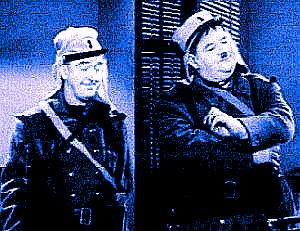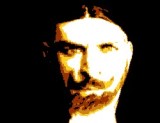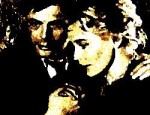Film Review
The first Laurel and Hardy film not to be produced by Hal Roach marks
the beginning of the decline in the duo's fortunes, although it would
be some time yet before they reached the nadir that was the
French-financed fiasco
Atoll K
(1951). In contrast to Twentieth Century Fox, who clearly had no
idea how to exploit the talents of these two comedy giants (evidenced
by
The Big Noise (1944)),
RKO-backed Boris Morros Productions did a decent job of following the
tried and tested Hal Roach formula: slapstick routines built around a
credible central narrative. Whilst not the best of Laurel and
Hardy's features,
The Flying Deuces
has some great comedic moments and still has what it takes to reduce a
mature adult audience to fits of infarctus-inducing hysterics.
The kids will love it too.
The Flying Deuces is essentially
an extended version of L & H's previous short,
Beau Hunks (1931), with Charles
Middleton reprising the role of the tyrannical legion commandant.
It is arguably the darkest of the duo's films, the familiar boisterous
slapstick garnished with some very black comedy. In one scene,
Stan and Ollie come tantalisingly close to committing suicide together;
in another, they are actually killed, although both are then magically
reincarnated for one of the film's best gags. There is a real
poignancy in the opening scenes in which Ollie's romantic dreams are
shattered - a rare excursion into sentimentality. Later, Mr Hardy
has a fine opportunity to show off his vocal skills in a pleasing
rendition of
Shine On Harvest Moon,
a number that was crowbarred into the film with absolutely no thought
whatsoever but which you would hate to see removed.
Things drag just a smidgen towards the middle, when it becomes apparent
that there is too much plot and too few jokes. Fortunately,
Stan's unerring inability to avoid walking into any solid object that
comes within three hundred yards of him provides enough laughs to keep
us choking on our popcorn. Things pick up with a vengeance in the last two reels,
with a constant stream of gags. Of the comedic highlights on
offer are Stan making an improvised harp out of his bedstead (allowing
him to do his Harpo Marx impression) and the duo alternately pursuing
and being pursued by a battalion of legionnaires - in an aeroplane. The
latter is the softening-up prelude to the film's main
set-piece, an hilarious sequence in which
our heroes try in vain to fly an aeroplane. You will be hard
pressed to find anything that is half as funny in any film made today.
© James Travers 2010
The above content is owned by frenchfilms.org and must not be copied.
Film Synopsis
During an enjoyable stay in Paris, Ollie falls in love with Georgette,
an innkeeper's daughter. So smitten is he by this object of
supreme loveliness that Ollie has resolved to marry her, not knowing
that she has fallen for a handsome legionnaire, François.
When he realises that his suit is useless, Ollie decides to drown
himself in the Seine, taking his friend Stan with him. At the
crucial moment, François appears and persuades Ollie that a few
weeks in the French Foreign Legion will be enough to make him forget
all about Georgette. Without a moment's delay, Stan and Ollie
enlist and soon find themselves at a remote outpost in North
Africa. It soon becomes apparent that the mild-mannered duo are
not cut out for military life and so, after various mishaps, they
decide to desert. Their commandant is incensed and once Stan and
Ollie have been recaptured he tells them they will be shot at
dawn...
© James Travers
The above content is owned by frenchfilms.org and must not be copied.



